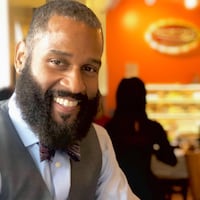A second grand juror in the Breonna Taylor case is seeking legal advice on how to speak publicly about the panel’s decision not to charge the police officers with murder in the woman’s fatal shooting, according to reports.
Former Louisville Metro Police Department Officer Brett Hankison, who was fired in June, was the only deputy indicted Sept. 23 in connection with the March shooting, but he was not charged with murder.
Hankison faces three counts of first-degree wanton endangerment unrelated to Taylor’s death for shooting into neighboring apartments on the night of the raid.
Last week, another unnamed grand juror came forward and said Kentucky Attorney General Daniel Cameron misled the public about the proceedings after he announced that the law did not permit him to charge the officers and that the grand jury had agreed with him.
»PREVIOUS COVERAGE: Grand juror claims Ky. attorney general misled public on Breonna Taylor
Cameron, however, acknowledged for the first time last week that he never put forth an option for the grand jury to indict Hankison or the other two officers — Jonathan Mattingly and Myles Cosgrove — for murder.
Cameron also previously declined to say what charges he recommended, but in a TV interview Cameron said he had recommended no charges against the officers.
The lawyer for the first unnamed juror filed a motion in court Sept. 29 seeking the release of grand jury recordings and transcripts and permission from a judge to speak publicly about the case.
For now, the second grand juror has only contacted a Louisville activist about her legal options and is awaiting the outcome of the hearing regarding the first grand juror before coming forward, CNN reported.
Cameron has until Wednesday to respond to the juror’s motion, and a hearing on that matter is scheduled for 1 p.m. Thursday, according to reports.
Cameron’s office released records of the proceedings late last week after a judge allowed extra time for prosecutors to redact witness names from testimony.
»PREVIOUS COVERAGE: Grand jury indicts 1 officer in Breonna Taylor case
“The request being made by the Grand Juror is unprecedented, and it is important that all of the legal issues in the case are fully considered,” Cameron said in a statement last week. “We understand there is considerable public interest in the case, and it will ultimately be up to the Judge to determine if Grand Jurors can share information from the proceedings. We remain confident in the case we presented to the Grand Jury.”
Taylor, a 26-year-old Black emergency medical worker, was shot multiple times March 13 by officers who entered her home using a no-knock warrant during a narcotics investigation.
Taylor’s death sparked national outrage and months of protests.
Cameron said last week the use of force by officers was justified because Taylor’s boyfriend, Kenneth Walker, was the first to open fire when police burst in, wounding Mattingly.
Walker was charged with attempted murder of a police officer, but prosecutors later dropped the charge after Walker said he heard knocking but didn’t know who was coming into the home and fired in self-defense.
Cameron said Hankison and the other officers who entered Taylor’s apartment announced themselves before entering — and so did not execute the warrant as “no-knock,” according to the investigation.
“According to Kentucky law, the use of force by Mattingly and Cosgrove was justified to protect themselves,” he said. “This justification bars us from pursuing criminal charges in Miss Breonna Taylor’s death.”
“Sometimes the criminal law is not adequate to respond to a tragedy,” he said.
Then in a surprise development, one of the unnamed grand jurors filed a motion in court seeking the release of court transcripts and permission from a judge to speak publicly about the proceedings.
Attorney Kevin Glogower said the grand juror came to him distressed after Cameron announced that the law did not permit him to charge the officers and that the jury had agreed with him.
According to Glogower, the juror was unsettled by the fact that the grand jury was not given an option of charging the two officers when the community was roiled by demonstrations seeking their indictment, The New York Times reported. The 12-member panel was presented only with possible charges against Hankison.
“This is something where the juror is not seeking any fame, any acclaim, any money,” said Glogower, according to The New York Times.
The exposure of grand jury proceedings upends a long tradition of keeping those deliberations secret.
Cameron, a Republican protégé of Senate Majority Leader Mitch McConnell and the state’s first African American attorney general, has been criticized since announcing the grand jury’s indictment for not seeking charges against the officers for killing Taylor.
Protesters took to the streets in Louisville and around the country to demand more accountability in the case, as frustrations spilled over after months of waiting for Cameron’s announcement. Activists and Taylor’s family called for the grand jury file to be released.
After the judge ordered the public release of the grand jury proceedings during Hankison’s arraignment, Cameron said the grand jury was meant to be a “secretive body,” but “it’s apparent that the public interest in this case isn’t going to allow that to happen.”
Taylor’s family is demanding that Gov. Andy Beshear intervene and reopen the inquiry with a new grand jury.
“Bre was a hero, a first responder who put her life on the line every day during this COVID-19 pandemic,” lawyer Benjamin Crump wrote. “Together, we demand a new grand jury to reopen Breonna Taylor’s case, immediately.”
About the Author
The Latest
Featured


